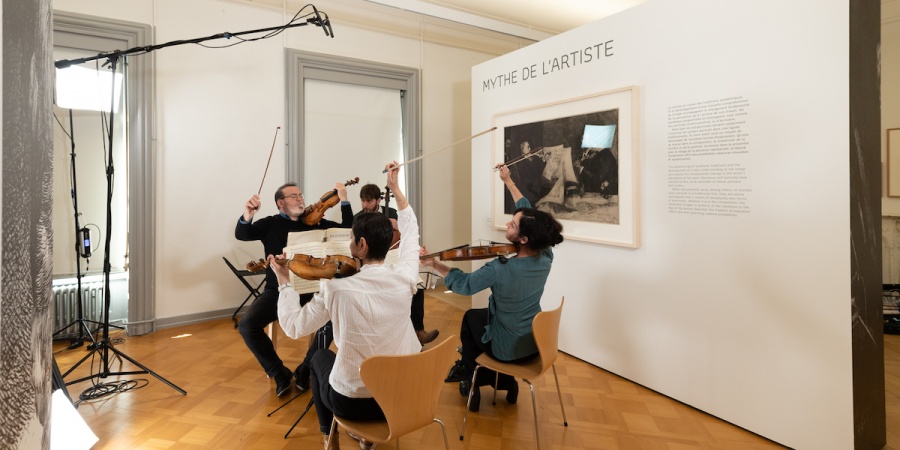Critique CD Vierne
Louis VIERNE (1870-1937)
Cycle Spleens et Détresses Op.38, poems by Paul Verlaine (1917) [32:17]
Piano Quintet Op.42 (1917) [34:39]
Anaïk Morel (soprano)
Mūza Rubackytė (piano)
Terpsycordes Quartet
rec. Fazioli Concert Hall, Sacile, 16-18 June 2014, 14-16 December 2015
BRILLIANT CLASSICS 95367 [66.56]
Most music lovers know Vierne from his organ symphonies and other works. His own instrument was the organ and he was for many years organist of Notre Dame. It is good to be reminded that there is much more to this composer than that.
Both pieces of music on this CD come from 1917, a year of particular grief for Vierne, and that sombreness is reflected in this music. Even amongst the unhappy lives of many composers, Vierne’s was especially blighted. Born with congenital cataracts, he was afflicted by endless problems of eyesight. In 1906, a fall into a hole in the road damaged his leg so badly that he had to rework his technique with the organ pedals, and in 1907 he almost died of typhoid. By the beginning of the First World War he was virtually destitute, having gone through a bitter divorce in 1909. His youngest (of three) children died in 1913, in 1915 his lover Jeanne Montjovet (not ‘Jean’, as given in the notes!) left him: in the same year, when he began the Verlaine song cycle, he was diagnosed with glaucoma, and had to go through various operations in Switzerland. Between May 1917, when the Verlaine cycle was first performed, and the Piano Quintet, his only son was killed in action. Later years were little better: his brother René, who helped transcribe his compositions, was blown up by a shell in 1918, leaving no trace. Later, Vierne was reduced to working in Braille, and would die when he collapsed of heart attack or stroke during what was his 1,750th (and was intended to be his final) recital.
The music here is overwhelmingly sad, but what is remarkable, especially in the Piano Quintet, is the control. This is undoubtedly the best reason for buying this CD: it is a work of great sorrow, but also of great strength and originality, something which deserves a more frequent place in the repertory. Listen, for example, to the use of string tone in the remarkable Larghetto sostentuto second movement. There is real passion as well as technical assurance. Both pianist, Mūza Rubackytė, and the Terpsycordes Quartet play with extraordinary depth and understanding. I first came to know this piece from the Hyperion recording (CDA67258) with Stephen Coombs and the Chilingirian (coupled with Reynaldo Hahn’s Piano Quintet in F sharp minor). That is a fine recording, throughout rather faster than this one, determined not to languish, and I would not be without it, but this new one has perhaps greater passion, and supplants the earlier in my affections.
The Verlaine cycle I found less impressive. Vierne had met Verlaine in the organ loft of Saint-Sulpice, and had been struck, in their wordless encounter, by the poet’s look of ‘absolute despair’. (Verlaine by this time was suffering from the drug-dependence and alcoholism which would kill him). The cycle has interesting moments but for me, at least, does not represent the composer at his best. It is irritating that texts are not included in the booklet: in songs, and especially here, text matters, particularly in the somewhat elusive, very subtle, verse of Verlaine. Anaïk Morel sings with attention to the text, and has a good voice.
I would recommend this CD for the special performance of the Piano Quintet, but the buyer’s choice might depend on the coupling. The Hyperion, with the Hahn, has uniformly finer music overall, but the Brilliant CD has the merit of reflecting Vierne in one year of his life and an outstanding performance of the Quintet.
Michael Wilkinson
article online: http://www.musicweb-international.com/classrev/2016/Jul/Vierne_quintet_…

